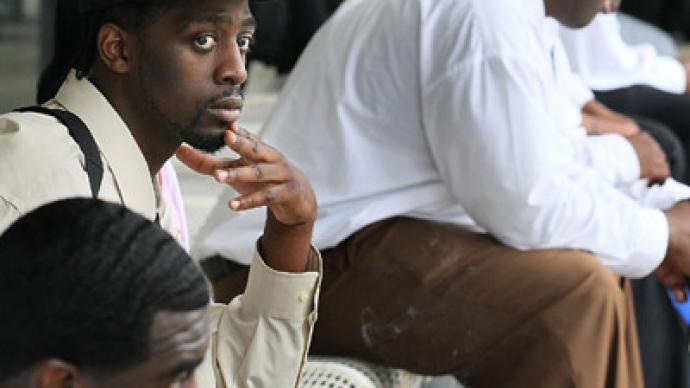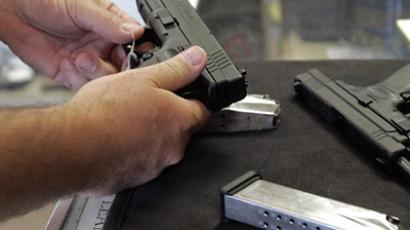Incarceration rate for African-Americans now six times the national average

The incarceration rate for American-Americans is so high that young black men without a high school diploma are more likely to go to jail than to find a job, thereby causing the breakup of families and instilling further poverty upon them.
“Prison has become the new poverty trap,” Bruce Western, a Harvard sociologist, told the New York Times. “It has become a routine event for poor African-American men and their families, creating an enduring disadvantage at the very bottom of American society.”While few would argue against locking up murderers and rapists, many social scientists have begun to discuss the problem of imprisoning too many people – especially when those people face long sentences for nonviolent crimes. The US has the highest incarceration rate in the world, locking up about 500 people for every 100,000 residents, according to the Bureau of Justice Statistics.The incarceration rate for African-Americans is about 3,074 per 100,000 residents, which is more than six times as high as the national average. Black men in their 20s and early 30s without a high school diploma are particularly vulnerable: with an incarceration rate of 40 percent, they are more likely to end up behind bars than in the workforce, Pew Charitable Trusts reports.“The collateral costs of locking up 2.3 million people are piling higher and higher,” said Adam Gelb, director of the Public Safety Performance Project of the Pew Center on the States. “Corrections is the second fastest growing state budget category, and state leaders from both parties are now finding that there are research –based strategies for low-risk offenders that can reduce crime at far less cost than prison.”But while the cost of keeping prisoners might be high for government, the cost is even higher for African-Americans – especially to poverty-stricken families who lose a relative to the penal system. The Times interviewed parents Carl Harris and Charlene Hamilton, whose daughters grew up without a father. Mr. Harris, a crack dealer who received a 20-year prison sentence at the age of 24, was forced to abandon his family when he was locked up.Unable to help out with the accumulating bills that come with raising children, Hamilton and her daughters ended up homeless on several occasions. Struggling to pay the rent and cover the costs of food, Hamilton also fought to pay for the out-of-state visits to see her daughters’ father.“Basically, I was locked up with him,” she told the Times. “My mind was locked up. My life was locked up. Our daughters grew up without a father.”And the couple’s story is not unique: 25 percent of African-Americans who grew up in the past three decades have had at least one parent locked up during their childhood, according to Project Muse. Police have more meticulously cracked down on crime and courts have imposed harsher sentences since 1980, causing the number of Americans – especially blacks – in state and federal prisons to quintuple.And some believe that certain crimes shouldn’t merit sentences as harsh as the US imposes. Police never caught Mr. Harris dealing drugs, but arrested him for assaulting two people at a crack den. The man is now facing a 20-year sentence for charges including assault, in which he “broke someone’s arm and cut another one in the leg”, as well as a charge of ‘armed burglary’ at the crack den.“The cops knew I was selling but couldn’t prove it, so they made up the burglary charge instead,” Mr. Harris told the Times.The high incarceration rate of African-Americans has a detrimental effect on the black community. Epidemiologists have linked high incarceration rates to an increase in sexually transmitted diseases and teenage pregnancy, since the majority of those incarcerated are men, leaving a prevalence of females and greater occurrences of unprotected sex.“A man will have three mistresses, and they’ll each put up with it because there are no other men around,” Hamilton said. Epidemiologists believe the AIDS rate among African-Americans would be lower if the incarceration rate dropped. A high incarceration rate also affects children growing up without parents, brothers or sisters. Children are more likely to grow up impoverished, uneducated and emotionally strained. They are also more likely to become aggressive or depressed and could eventually end up in prison themselves.“Education, income, housing, health – incarceration affects everyone and everything in the nation’s low-income neighborhoods,” Megan Comfort, a sociologist at RTI International, told the Times.Since the incarceration rate is highest for African-Americans, it makes it more difficult for blacks to rise out of poverty, receive higher levels of education, and escape a life of crime. Young African-Americans are more often imprisoned than employed.“The social deprivation and draining of capital from these communities may well be the greatest contribution our state makes to income inequality,” Dr. Donald Braman, a George Washington University Law School anthropologist, told the Times. “There is no social institution I can think of that comes close to matching it.”While mass incarceration might temporarily reduce crime, in the long run, more Americans end up impoverished and more likely to commit a crime themselves.














